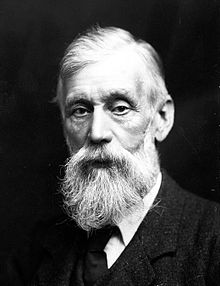Michael Foster (physiologist)
| Sir Michael Foster | |
|---|---|

Michael Foster
|
|
| Born |
8 March 1836 Huntingdon, England |
| Died | 29 January 1907 (aged 70) London, England |
| Nationality | British |
| Fields | Physiologist |
| Institutions | |
| Alma mater | University College School |
| Academic advisors | |
| Notable students | |
| Known for | Textbook of Physiology (1876) |
| Influenced | |
Sir Michael Foster, KCB, DCL, MD (8 March 1836 – 29 January 1907) was an English physiologist. He was instrumental in organizing the Cambridge Biological School and acted as Secretary of the Royal Society.
Foster was born in Huntingdon, Huntingdonshire, in March 1836, the son of Michael Foster, FRCS. He was educated at Huntingdon Grammar school and University College School, London. After graduating in medicine in 1859, he began to practise in his native town, but in 1867 he returned to London as teacher of practical physiology at University College London, where two years afterwards he became professor. In 1870 he was appointed by Trinity College, Cambridge, to its praelectorship in physiology, and thirteen years later he became the first occupant of the newly created chair of physiology in the university, holding it till 1903. One of his most famous students at Cambridge was Charles Scott Sherrington who went on to win the Nobel Prize in 1932.
He married first, in 1864, Georgina Edmonds, daughter of Cyrus Read Edmonds. Following her death in 1869, he married secondly, in 1872, Margaret Rust, daughter of George Rust, JP, of Huntingdon.
He excelled as a teacher and administrator, and had a very large share in the organization and development of the Cambridge biological school. From 1881 to 1903 he was one of the secretaries of the Royal Society, and in that capacity exercised a wide influence on the study of biology in Britain. In the 1899 Birthday Honours, he was created a Knight Commander of the Order of the Bath (KCB), and served as president of the British Association at its meeting at Dover in September 1899.
...
Wikipedia
